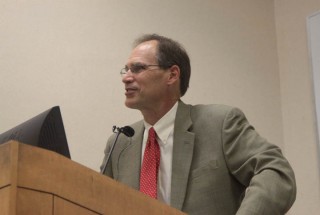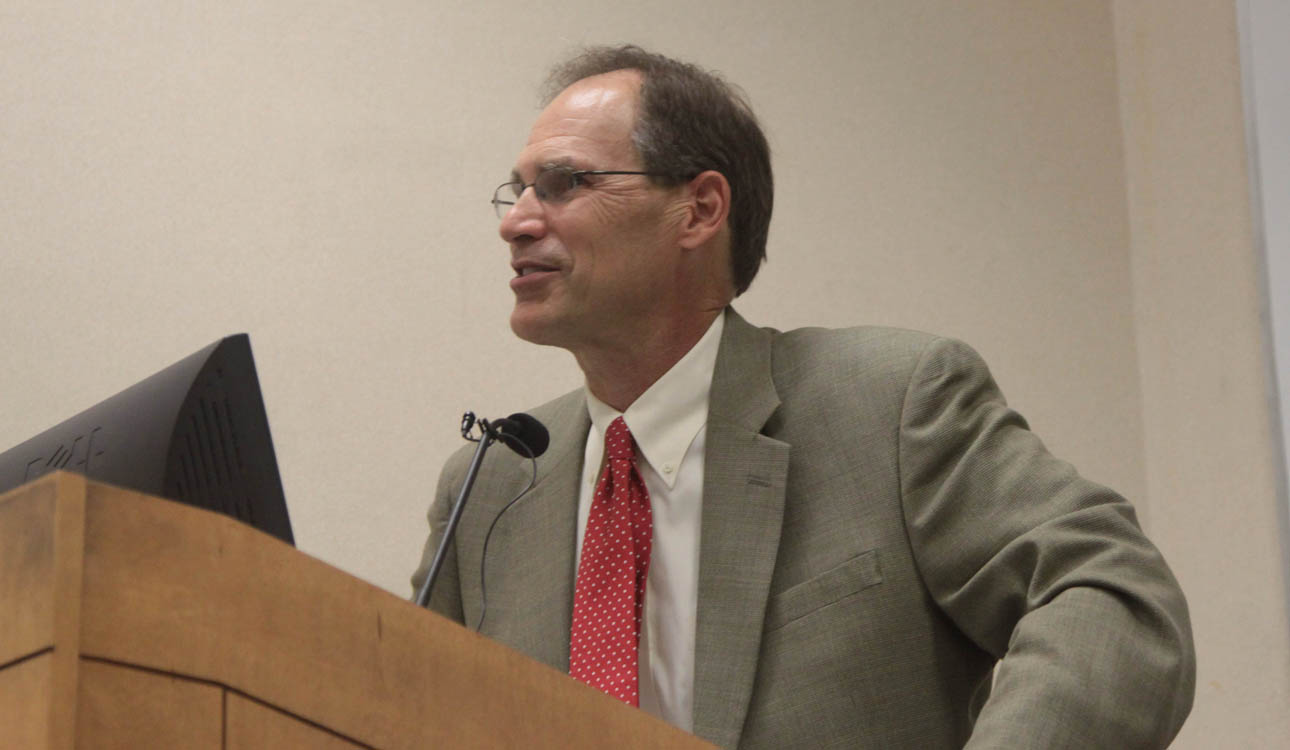
Ambika Singh | Staff photographer
By Daniel Houston
Staff Writer
Five experts on American history converged Monday at Baylor to give lectures on the impact of religion on the people and events surrounding the American Civil War.
The lectures, part of the Symposium on the Civil War and Religion, were hosted by Baylor’s Institute for Studies of Religion.
Dr. George Rable, the Charles G. Summersell chair of Southern history and professor at the University of Alabama, gave the afternoon keynote lecture.
Rable said citizens of both Union and Confederate states tried to understand the war in terms of their own interpretations of divine providence.
“I was recently asked to give a talk at Birmingham-Southern College,” Rable said, “and the person planning the talk wanted a provocative title and so he chose, ‘Was the American Civil War a Holy War?’ And I said, well, yes it was; in fact, probably the holiest war in American history if you define that as a war in which more people interpret it in religious terms.”
Rable used examples of prayers offered by Christian ministers on both sides of the conflict to illustrate how both tended to believe their cause was supported by God’s divine providence, and would therefore ultimately triumph.
Before the afternoon’s symposium, a panel of three professors presented papers on the subject. Dr. Amy Taylor, associate professor of history at SUNY-Albany; Dr. Robert Elder, lecturer in humanities at Valparaiso University; and Dr. Luke Harlow, assistant professor of history at Oakland University were included in the symposium.
In his lecture, Elder said the South fought in the Civil War not only to preserve the economic institution of slavery, but also because many southerners combined their Christian identity with a sense of honor that they felt the Union forces threatened.
“Thus,” Elder said, “violence took on a moral significance within honor as a righteous or morally positive response to the threat of shame. Violence in response to an insult or in defense of one’s home or family formed the core ethical demand of what one historian has called ‘primal honor.’”
Elder pointed out there exists a contradiction between the Christian emphasis on forgiveness and the honor-driven duty to use violence under certain circumstances, but many people nevertheless synthesized the two as part of one whole worldview.
“Much more than a collection of rituals surrounding the duel, honor in the South was a deep-seated ethical system with its own internal logic and more than a passing resemblance to religion,” Elder said.
The majority religious perspective in the state of Kentucky, which remained loyal to the Union during the war despite having a population split on the issue of slavery, shifted heavily in favor of slavery from a theological perspective after the war’s end, said Harlow. This affected the war’s conclusion.
“When slavery disappeared, so too did the middle ground,” Harlow said. “The result was a racist unity legitimated by post-bellum clergy and laity who rejected civil rights for African-Americans, embraced a Confederate memory of the Civil War, [and] paved the way for the emergence of a dominant white-Democratic political block in the state.”
This rejection of the northern theological positions that slavery was wrong led to clashes within denominations, Harlow said.
This was illustrated by the decision of many Kentucky Presbyterians to cease contributing money to the Presbyterian general assembly, which had taken a stance against slavery, he said.
Taylor presented a paper that brought light to the challenge of providing for escaped slaves who fled to Union-occupied territory.
Taylor said the refugees set up camps that were rife with poverty, starvation and death, which posed a challenge for northern Christians who believed their freedom would bring happiness, not suffering.
From a practical perspective, Taylor said, northern Christians worked to assist the refugees by providing clothing and education as best they could.
From a theological perspective, some northern Christians were hopeful that the suffering many ex-slaves experienced was merely a transitional period akin to the 40 years the Hebrews spent in the wilderness before returning to the promised land.
“Perhaps today,” Taylor said, “if we keep the wilderness in view, the suffering in the Civil War’s contraband camps, we’ll better see emancipation as it was experienced on a day-to-day basis: as protracted, chaotic, deadly, but ultimately hopeful.”
Dr. John Boles, professor of history at Rice University, critiqued the papers presented by the three other panelists and affirmed most of their interpretations of the historical record.
“The three fine papers we have just heard clearly and definitively make the point that without close consideration of religion we cannot understand the main currents of the American historical experience,” Boles said.
“Humans do not act just for economic reasons; they are not simply cold, rational actors; they do not just follow the impulses of their emotions or the commands of a leader. Surely these factors must be taken into account, but even more so should the larger systems of meaning within which persons seek understanding of their human situation and ultimate purpose for their lives.”






